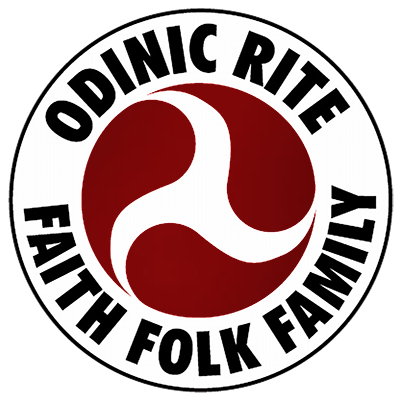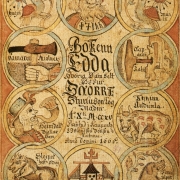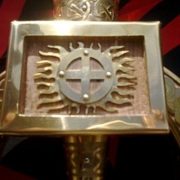Comparison between the Sleeping Beauty tale and some Norse myths
By Hariulf OR
As many of you know, there is much wisdom in fairy tales. We find preserved in children’s literature traces of old Indo-European myths. This is particularly true in The Brothers Grimm’s fairy tales. Wilhelm Grimm said himself: “the elements found in all fairy-tales are like fragments of a broken stone that we have scattered on the floor, amid the grass and flowers: only the most piercing eyes can discover them. Their meaning is long lost, but we feel it again and this is what gives the tale its value. ”
In ORB 212, a comrade had analysed a Grimm’s tale entitled: The Golden Bird. He had highlighted the shamanic nature that emerged from this tale. In this article I will try to “analyse” another well-known Grimm’s tale: The Sleeping Beauty. I’ll just try to extract the mythological influences that may have served its composition. In reading this story to my daughter, I realized that there were, at least in my opinion, many parts which may refer to our mythology, including the myth of Balder and his death.
I want to say that I am absolutely not a specialist of myths or of tales and legends. This is just some ideas that I had in reading this tale. I think we can of course give a lot of other different explanations, or find parallels with some other myths.
I think most of you have heard or read the story of the Sleeping Beauty, if this is not the case, here is the story (you can also find all the Grimm’s tales here: http://www.grimmstories.com/en/grimm_fairy-tales/index) :
In times past there lived a king and queen, who said to each other every day of their lives, “Would that we had a child!” and yet they had none. But it happened once that when the queen was bathing, there came a frog out of the water, and he squatted on the ground, and said to her, “Thy wish shall be fulfilled; before a year has gone by, thou shalt bring a daughter into the world.”
And as the frog foretold, so it happened; and the queen bore a daughter so beautiful that the king could not contain himself for joy, and he ordained a great feast. Not only did he bid to it his relations, friends, and acquaintances, but also the wise women, that they might be kind and favourable to the child. There were thirteen of them in his kingdom, but as he had only provided twelve golden plates for them to eat from, one of them had to be left out.
However, the feast was celebrated with all splendour; and as it drew to an end, the wise women stood forward to present to the child their wonderful gifts: one bestowed virtue, one beauty, a third riches, and so on, whatever there is in the world to wish for. And when eleven of them had said their say, in came the uninvited thirteenth, burning to revenge herself, and without greeting or respect, she cried with a loud voice, “In the fifteenth year of her age the princess shall prick herself with a spindle and shall fall down dead.” And without speaking one more word she turned away and left the hall. Everyone was terrified at her saying, when the twelfth came forward, for she had not yet bestowed her gift, and though she could not do away with the evil prophecy, yet she could soften it, so she said, “The princess shall not die, but fall into a deep sleep for a hundred years.”
Now the king, being desirous of saving his child even from this misfortune, gave commandment that all the spindles in his kingdom should be burnt up. The maiden grew up, adorned with all the gifts of the wise women; and she was so lovely, modest, sweet, and kind and clever, that no one who saw her could help loving her. It happened one day, she being already fifteen years old, that the king and queen rode abroad, and the maiden was left behind alone in the castle. She wandered about into all the nooks and corners, and into all the chambers and parlours, as the fancy took her, till at last she came to an old tower. She climbed the narrow winding stair which led to a little door, with a rusty key sticking out of the lock; she turned the key, and the door opened, and there in the little room sat an old woman with a spindle, diligently spinning her flax.
“Good day, mother,” said the princess, “what are you doing?” “I am spinning,” answered the old woman, nodding her head. “What thing is that that twists round so briskly ?”asked the maiden, and taking the spindle into her hand she began to spin; but no sooner had she touched it than the evil prophecy was fulfilled, and she pricked her finger with it. In that very moment she fell back upon the bed that stood there, and lay in a deep sleep.
And this sleep fell upon the whole castle; the king and queen, who had returned and were in the great hall, fell fast asleep, and with them the whole court. The horses in their stalls, the dogs in the yard, the pigeons on the roof, the flies on the wall, the very fire that flickered on the hearth, became still, and slept like the rest; and the meat on the spit ceased roasting, and the cook, who was going to pull the scullion’s hair for some mistake he had made, let him go, and went to sleep. And the wind ceased, and not a leaf fell from the trees about the castle. Then round about that place there grew a hedge of thorns thicker every year, until at last the whole castle was hidden from view, and nothing of it could be seen but the vane on the roof.
And a rumour went abroad in all that country of the beautiful sleeping Rosamond, for so was the princess called; and from time to time many kings’ sons came and tried to force their way through the hedge; but it was impossible for them to do so, for the thorns held fast together like strong hands, and the young men were caught by them, and not being able to get free, there died a lamentable death.
Many a long year afterwards there came a king’s son into that country, and heard an old man tell how there should be a castle standing behind the hedge of thorns, and that there a beautiful enchanted princess named Rosamond had slept for a hundred years, and with her the king and queen, and the whole court. The old man had been told by his grandfather that many king’s sons had sought to pass the thorn-hedge, but had been caught and pierced by the thorns, and had died a miserable death. Then said the young man, “Nevertheless, I do not fear to try; I shall win through and see the lovely Rosamond.” The good old man tried to dissuade him, but he would not listen to his words. For now the hundred years were at an end, and the day had come when Rosamond should be awakened. When the prince drew near the hedge of thorns, it was changed into a hedge of beautiful large flowers, which parted and bent aside to let him pass, and then closed behind him in a thick hedge. When he reached the castle-yard, he saw the horses and brindled hunting-dogs lying asleep, and on the roof the pigeons were sitting with their heads under their wings. And when he came indoors, the flies on the wall were asleep, the cook in the kitchen had his hand uplifted to strike the scullion, and the kitchen-maid had the black fowl on her lap ready to pluck.
Then he mounted higher, and saw in the hall the whole court lying asleep, and above them, on their thrones, slept the king and the queen. And still he went farther, and all was so quiet that he could hear his own breathing; and at last he came to the tower, and went up the winding stair, and opened the door of the little room where Rosamond lay. And when he saw her looking so lovely in her sleep, he could not turn away his eyes; and presently he stooped and kissed her.
And she awoke, and opened her eyes, and looked very kindly on him. And she rose, and they went forth together, and the king and the queen and whole court waked up, and gazed on each other with great eyes of wonderment. And the horses in the yard got up and shook themselves, the hounds sprang up and wagged their tails, the pigeons on the roof drew their heads from under their wings, looked round, and flew into the field, the flies on the wall crept on a little farther, the kitchen fire leapt up and blazed, and cooked the meat, the joint on the spit began to roast, the cook gave the scullion such a box on the ear that he roared out, and the maid went on plucking the fowl.
Then the wedding of the Prince and Rosamond was held with all splendour, and they lived very happily together until their lives’ end.
***
The first thing that caught my attention was this part:
“…but also the wise women, that they might be kind and favourable to the child. There were thirteen of them in his kingdom, but as he had only provided twelve golden plates for them to eat from, one of them had to be left out…”
This part struck me because it reminded me a part from Gylfaginning 20:
“…Then asked Ganglere: Which are the asas, in whom men are bound to believe? Har answered him: Twelve are the divine asas…”
Then follows the enumeration of these twelve Aesir: Odin, Thor, Balder, Njord, Tyr, Bragi, Heimdall, Hödr, Vidar, Vali, Ullr, and Forseti.
Then, Snorri says in Gylfaginning 33:
“…There is yet one who is numbered among the asas, but whom some call the backbiter of the asas. He is the originator of deceit, and the disgrace of all gods and men. His name is Loke, or Lopt… »
In the tale, each of the twelve wise women offers a fabulous gift to the child: virtue, beauty, wealth, etc. I think that we can maybe compare the twelve wise women with the twelve Aesir who are benevolent toward their Folk. I saw Loki as being the thirteenth “wise woman” in the tale, like he is the thirteenth “Aesir” named in the Gylfaginning. In fact he is not really an Aesir. As Loki, this thirteenth “wise womon” gave absolutely nothing beneficial, quite the contrary.
The second thing that struck me from this part is its resemblance to one of our myths: the Lokasenna.
Twelve “Aesir” are gathered for a feast given by Aegir: Odin, Frigg, Sif, Bragi, Idunn, Tyr, Njord, Skadi, Frey, Freya, Vidar and Aegir.
As the thirteenth “wise woman” in the Sleeping Beauty’s tale, Loki does not appear to have been invited to the feast. Once entered in the hall, Loki insults the Gods and Goddesses to take revenge for not being invited. In the tale, the thirteenth “wise woman” enters the hall and without greeting anyone, she launches her curse on the princess. In the Lokasenna, Odin asks Vidar to leave his place and give it to Loki. We can maybe compare this to the fact that the 13th “wise woman” takes the place of the 12th in the tale: “…and when eleven of them had said their say, in came the uninvited thirteenth, burning to revenge herself, and without greeting or respect, she cried with a loud voice…”
These points make me think that maybe the beginning of the tale has been impregnated by a part of the Lokasenna. At least we find the model of the feast ruined by a person who wants revenge because she was not invited.
The second thing that struck me on reading this tale is the number of elements that refer to one of our very important myths: the death of Balder. I’ll try to list them one after the other.
“…And when eleven of them had said their say, in came the uninvited thirteenth, burning to revenge herself, and without greeting or respect, she cried with a loud voice, “In the fifteenth year of her age the princess shall prick herself with a spindle and shall fall down dead…”
Like Balder, The Sleeping Beauty is totally aware of her doom. In fact, all the people present in the hall are aware of her inevitable and imminent death. It’s the same for Balder. We know by our mythology that Balder had a dream of his own death. Balder tells his dreams to the Aesir. After having discussed these dreams, Odin rides to Hel and awakens a seeress, who tells him Hödr will kill Baldr but Vali will avenge him. Frigg, the mother of Balder, made every object on earth vow never to hurt Baldr. All objects made this vow except mistletoe: Frigg had thought it too unimportant and nonthreatening to bother asking it to make the vow. So, we can see some parallels between the tale and the myth. We can maybe also compare the spindle and the mistletoe arrow.
“…when the twelfth came forward, for she had not yet bestowed her gift, and though she could not do away with the evil prophecy, yet she could soften it, so she said, “The princess shall not die, but fall into a deep sleep for a hundred years…”
We find in this part, the idea that the “death” is not an end but rather a new beginning after a time of rest. The Sleeping Beauty “will come back to life” after a certain time of slumber (an allegory of death?). It will be the same for Balder. As we know, after his death Balder will go to Hellheim where he will remain for some time before finally returning after Ragnarok.
“…Now the king, being desirous of saving his child even from this misfortune, gave commandment that all the spindles in his kingdom should be burnt up…”
We can compare this to part of the Balder Myth: Frigg, the mother of Balder, made every object on earth vow never to hurt Balder. Now, Balder is in some way protected against all evil.
“…The maiden grew up, adorned with all the gifts of the wise women; and she was so lovely, modest, sweet, and kind and clever, that no one who saw her could help loving her…”
This description of The Sleeping Beauty is for me very similar to that of Balder, a person benevolent, beautiful and loved by all: “…The second son of Odin is Balder, and good things are to be said of him. He is best, and all praise him; he is so fair of feature, and so bright, that light shines from him. A certain herb is so white that it is likened to Baldr’s brow; of all grasses it is whitest, and by it thou may judge his fairness, both in hair and in body. He is the wisest of the Aesir, and the fairest-spoken and most gracious…”
“…Good day, mother,” said the princess, “what are you doing?” “I am spinning,” answered the old woman, nodding her head. “What thing is that that twists round so briskly? Asked the maiden, and taking the spindle into her hand she began to spin; but no sooner had she touched it than the evil prophecy was fulfilled, and she pricked her finger with it. In that very moment she fell back upon the bed that stood there, and lay in a deep sleep…”
We can compare this to the death of Balder. As Balder is now “invulnerable”, the Aesir throw all manner of weapons on him because they cannot harm him. When Loki, the mischief-maker, heard of this, he made a magical spear from this plant (in some later versions, an arrow). He hurried to the place where the gods were indulging in their new pastime of hurling objects at Baldr, which would bounce off without harming him. Loki gave the mistletoe to Baldr’s brother, the blind god Hödr, who then inadvertently killed his brother with it (other versions suggest that Loki guided the arrow himself). We can also see that death is caused “accidentally” (we must face our Wyrd) by an innocent person: Hödr in the myth of Balder, the old woman in the tale of Sleeping Beauty.
“…And she awaked, and opened her eyes, and looked very kindly on him. And she rose, and they went forth together, and the king and the queen and whole court waked up, and gazed on each other with great eyes of wonderment. And the horses in the yard got up and shook themselves, the hounds sprang up and wagged their tails, the pigeons on the roof drew their heads from under their wings…”
I think that all this part reflects the return of Balder after the Ragnarok. We know that after the Ragnarok, Balder returns (wakes again) to life. We also know that the earth wakes again; it will be green again as the golden tables reappear. The fields will grow again and so on. As stated in the Volupsa:
“There shall again
the wondrous
golden tables
in the grass be found,
which in days of old
had possessed
the ruler of the gods,
and Fjölnir´s race.
Unsown shall
the fields bring forth,
all evil be amended;
Baldr shall come;
Hödr and Baldr,
the heavenly gods,
Hropt´s glorious dwellings shall inhabit.
Understand ye yet, or what?”
“…Then the wedding of the Prince and Rosamond was held with all splendour, and they lived very happily together until their lives’ end…”
Just as in the tale, with the return of Balder comes a new golden age, an age of joy and happiness for all eternity.
“She a hall sees standing
than the sun brighter,
with gold bedecked,
in Gimill:
there shall the righteous
people dwell,
and for evermore
happiness enjoy.”
Those are the connections I found between the myth of Balder and the tale of Sleeping Beauty. As I said earlier in this article, I am anything but an expert in mythology. I’m sure there is much more to say on this story and its connections with our various myths. I’m also sure that we can interpret this tale in a more personal way, but I’ll stop there. I hope that my interpretations are not too far-fetched and not too boring. I’m sure we can find in many other tales mythological influence. This is a subject that I intend to develop in other articles.





